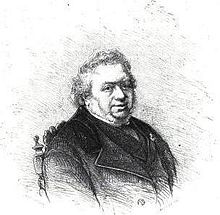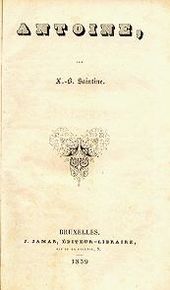X. B. Saintine
X. B. Saintine | |
|---|---|
 Saintine Wood-engraving by Étienne Bocourt | |
| Born | Joseph Xavier Boniface 10 July 1798 Paris, France |
| Died | 21 January 1865 (aged 66) Paris, France |
| Occupation(s) | Playwright, novelist |

Xavier Boniface Saintine (10 July 1798 – 21 January 1865) was a French dramatist and novelist.
Biography
[edit]He was born Joseph Xavier Boniface in Paris in 1798. In 1823, he produced a volume of poetry in the manner of the Romanticists, entitled Poèmes, odes, épîtres. In 1836 appeared Picciola, a novel about the Count de Charney, a political prisoner in Piedmont, whose reason was saved by his cultivation of a tiny flower growing between the paving stones of his prison yard. This story is a masterpiece of the sentimental kind, and was translated into many European languages.[1] The novel earned him renown and came to be regarded as a classic of French literature.[2]
He produced many other novels, none of striking individuality with the exception of Seul (1857), which purported to be the authentic record of Alexander Selkirk on his desert island. Saintine was a prolific dramatist, and collaborated in more than 200 pieces with Eugène Scribe and others, usually under the name of Xavier. He co-wrote the story which was to form the basis for Bellini's opera I puritani. He died in Paris in 1865.[1][2]
Selected works
[edit]A very prolific author, he wrote more than 200 theatre plays and novels under the pen names Saintine, X.B. Saintine, Joseph Xavier Saintine, Xavier.
- Books
- Poëmes, odes, épitres. (1823)
- Jonathan le Visionnaire, contes philosophiques et moraux. [1](1825)
- Histoire des Guerres d'Italie, Campagne des Alpes. (1826)
- Histoire de la Civilisation antédiluvienne. (1830)
- Le Mutilé. [2] (1832)
- Une Maîtresse de Louis XIII. in 2 volumes [3] & [4] (1834)
- Picciola. (1836)
- Les Soirées de Jonathan, in 2 volumes [5] & [6] (1837)
- Antoine, l'ami de Robespierre. [7](1839)
- Les Récits dans la Tourelle : Un Rossignol pris au Trébuchet, etc. [8]. (1844)
- Les Métamorphoses de la Femme. [9] (1846)
- Les trois Reines. (1853)
- Seul ! (1857)
- Chrisna. [10] (1860)
- Trois ans en Judée. [11] (1860)
- La belle Cordière et ses trois amoureux. (1861)
- Le Chemin des écoliers (1861) including an illustrated edition with 450 vignettes by Gustave Doré, grand in-8, broché. [12]
- Contes de toutes les couleurs : Léonard le cocher, etc. [13] (1862)
- La Mythologie du Rhin [14]; (1862) including an edition illustrated by Gustave Doré, grand in-8, broché.
- La Mère Gigogne et ses trois filles : La nature et ses trois règnes; causeries et contes d'un bon papa sur l'histoire naturelle et les objets les plus usuels (1863), grand in-8, illustrated with 171 vignettes by Foulquier and Faguet, broché. [15]
- La Seconde Vie. (1864)
- Theater plays
- 1833 (25 September): Têtes Rondes et Cavaliers, with Jacques-François Ancelot, Théâtre du Vaudeville; it also formed the basis for the libretto of the 1835 opera I Puritani, by Vincenzo Bellini
- 1834: Le Mari de la favorite, five-act comedy, with Michel Masson, Théâtre de la Porte-Saint-Martin
- 1836: Madame Favart, with Michel Masson, Théâtre du Palais Royal
- 1841: Mademoiselle Sallé with Jean-François Bayard and Dumanoir, Théâtre du Palais Royal
References
[edit]- ^ a b Chisholm 1911.
- ^ a b Garnett, Richard, ed. (1899). The International Library of Famous Literature: Selections from the World's Great Writers Ancient, Medieval, and Modern, with Biographical and Explanatory Notes and Critical Essays by Many Eminent Writers, Vol. X. London: The Standard, p. 4732.
Attribution:
- This article incorporates text from a publication now in the public domain: Chisholm, Hugh, ed. (1911). "Saintine, Joseph Xavier". Encyclopædia Britannica. Vol. 24 (11th ed.). Cambridge University Press. p. 9.
Further reading
[edit]- Clapin, A. C. (1883). "Preface", Picciola. Oxford University Press. Detailed biography of Saintine in the introduction to his most famous work.
